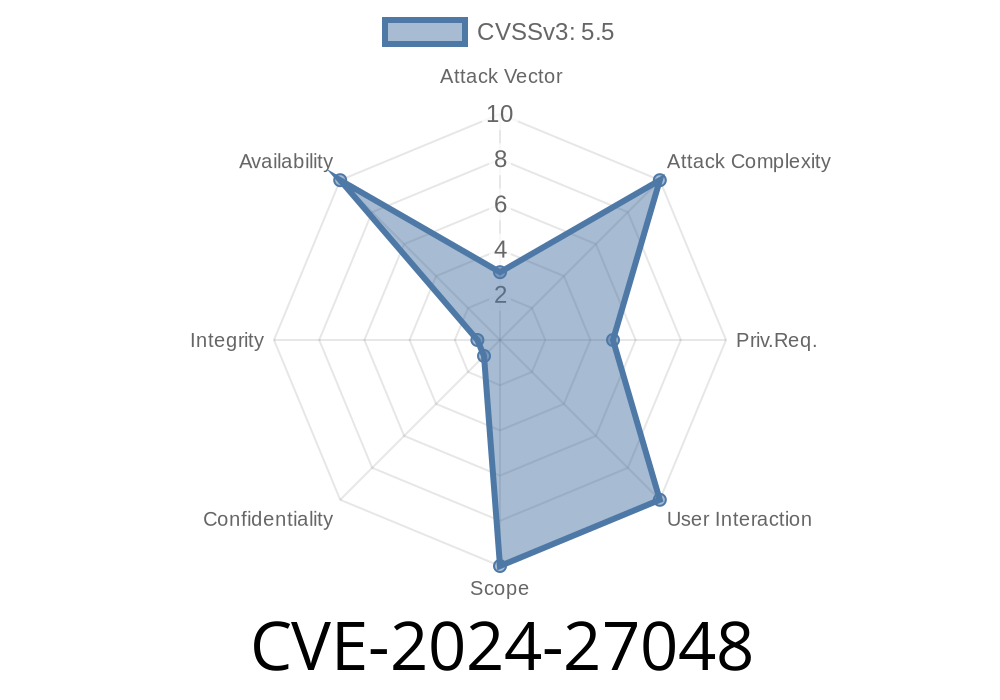The Linux kernel is powerful, but it’s not free from software bugs that can lead to security vulnerabilities. In early 2024, a vulnerability—CVE-2024-27048—was discovered and patched in the Broadcom WiFi driver (brcm80211) of the Linux kernel. This post will break down what happened, why it was dangerous, and how the fix works. We’ll use simple language, code samples, and reference links, so even if you’re not a kernel developer, you can follow along.
What Is CVE-2024-27048?
This CVE addresses a classic issue: a function tries to allocate memory but doesn’t check if the allocation succeeded. If the allocation fails (due to the system running low on RAM), it returns a NULL pointer. If the kernel then tries to use that NULL pointer, it crashes—something called a “null pointer dereference.” In kernel space, this can be critical, leading to system instability or a denial-of-service.
Where Did This Happen?
The problem appears in the Broadcom WiFi driver (brcm80211), specifically in the brcmf_pmksa_v3_op() function. This function uses kzalloc() to allocate memory for operations related to managing WiFi security (PMKSA, or Pairwise Master Key Security Association). If kzalloc() fails, and the result is not checked, the code may dereference a NULL pointer, causing a crash.
Here’s a simplified code snippet showing the problem
struct brcmf_pmk_op *pmk_op;
pmk_op = kzalloc(sizeof(*pmk_op), GFP_KERNEL);
// The vulnerable part - no check for NULL pointer
pmk_op->something = ...; // ← If pmk_op is NULL, this will crash!
If kzalloc() returns NULL (for example, if memory is exhausted), then trying to access pmk_op->something will dereference a NULL pointer.
The Fix – How Maintainers Resolved It
To fix the bug, kernel maintainers added a check to see if the memory allocation succeeded. If memory allocation fails, it returns -ENOMEM (an error code for “out of memory”) and avoids dereferencing the NULL pointer.
The Secure Code (After the Fix)
struct brcmf_pmk_op *pmk_op;
pmk_op = kzalloc(sizeof(*pmk_op), GFP_KERNEL);
if (!pmk_op) // If allocation failed
return -ENOMEM; // Exit the function safely
pmk_op->something = ...; // Safe to use now
This stops the crash and keeps the kernel stable, even in low-memory situations.
Why Does This Matter?
- Denial-of-Service: An attacker could intentionally try to exhaust memory, triggering this bug, and crash the kernel.
- Reliability: Even accidental memory exhaustion by normal system use would have caused WiFi system instability.
Proof-of-Concept: How Could It Be Exploited?
While there’s no public, weaponized exploit, you could theoretically cause this issue on an affected kernel by allocating all system memory (e.g., with a memory-hogging process). When the WiFi PMKSA function is triggered—say, connecting to a WiFi network—the vulnerable function would crash the kernel.
Here’s a simulated PoC (for discussion purposes only!)
# On system with vulnerable kernel and Broadcom WiFi
# Allocate all memory
stress --vm 1 --vm-bytes 100% --timeout 60
# Trigger WiFi association (could happen automatically)
nmcli device wifi connect <SSID>
If the memory was exhausted, and the kernel entered the vulnerable path, you’d see a kernel Oops or panic related to brcmf_pmksa_v3_op.
References and Further Reading
- Original Kernel Patch
- CVE Details for CVE-2024-27048
- Linux Kernel kzalloc Documentation
Conclusion
CVE-2024-27048 wasn’t the most glamorous of bugs, but it’s a great reminder how even small oversights in critical code can have major impacts on system reliability and security.
If you run a Linux system, especially with Broadcom WiFi, make sure you keep your kernel patched to avoid these types of issues. It’s better to be safe than sorry!
If you found this post helpful, please share it, keep your systems updated, and always check those return codes!
Timeline
Published on: 05/01/2024 13:15:49 UTC
Last modified on: 12/23/2024 19:05:50 UTC
